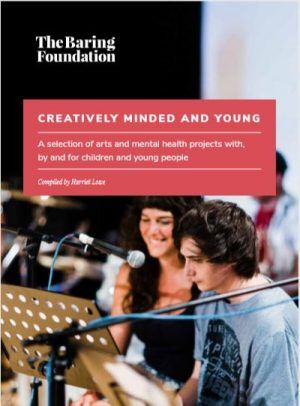Those of us who work in arts for health and arts for mental health know that creativity and culture can make a difference in people’s lives. I don’t need to list the benefits here – the list is long! However, all of us grapple with how to show health commissioners and funders that what we do is valuable – that it can help achieve the targets that they need to attend to, whether that’s improved health outcome scores, waiting times or use of a service.
For the last few years, I’ve been in the interesting position of having a foot in two worlds, with a practice as a clinical psychologist and the lead for Greater Manchester’s unique GM i-THRIVE Arts, Culture and Mental Health programme.
Grappling with the same problems as everyone else, we decided to co-develop the Youth Mental Health Arts & Culture Evaluation Kit to help explain the effects of taking part in the arts.
One of the obstacles to more creative commissioning by health services, we believed, is the lack of a consensus approach by arts and cultural providers, i.e. we all do it in different, though valid, ways. So, we decided to design a kit to help the arts sector in Manchester use common outcomes that are easily applied, appropriate to their setting, and useful to commissioners.
Uniquely (we believe), the kit was co-developed through workshops in a collaboration between: the GM i-THRIVE team (clinical), Greater Manchester i-THRIVE and Greater Manchester Combined Authority as part of the Great Place programme, 42nd Street, Arts Council England, Mahdlo Youth Zone, University of Manchester, Z-arts, Lime Arts, Contact Theatre and other key stakeholders.
You can read more about our partners and its development here.
The final product:
- allows information on wellbeing, attendance, satisfaction with the intervention and other meaningful outcomes such as cost to be collected, and used by the organisations themselves;
- uses some of the same outcome measures collated by NHS mental health services, and measures of interest to commissioners such as waiting times and costs, ensuring consistency and utility; and
- ensures that there is agreed minimum and consistent data and evidence collated when delivering arts and culture programmes which are intended to impact on children and young people’s mental health and wellbeing in Greater Manchester.
We are really pleased with the impact the Kit has had. GM’s Youth Mental Health Arts & Culture programme has grown – and is attracting interest from NHS stakeholders more broadly. We have had 80 requests from other organisations for the evaluation kit which suggests an interest in and need for the collaborative approach it embodies (see below for how to request).
However, I want to end with a broader thought eloquently expressed by Ben Walmsley and Anne Torreggiani who caution against reductivist methods in ‘measuring’ impact in arts and culture in a recent article in Arts Professional:
“One of the most powerful things we can do is to help the sector mine the rich seam of evidence that already exists, hidden from sight within academic publications, in forgotten archives and on ageing hard-drives. We have an important role to play in signposting and synthesising the best evidence out there. We can stop hard-pressed cultural practitioners straining to prove what has already been proven – or otherwise – and instead help them build on what is already known. We can nurture a culture of evidence-sharing which currently struggles to thrive in an anti-failure environment.
Most powerful of all, we can help to address the “so what?”. In order to get a real sense of social and public value we need to work as a collective, combining our stories, evidence, findings and experience to make what we know to be a compelling case.”
For my part, I hope that supporting the arts sector to be able to demonstrate these specific as well as creative outcomes (such as exhibitions and performances) and stories – will facilitate the commissioning of evidence-based arts and cultural activities, ultimately providing children and young people with a more holistic offer for their mental well-being.
Interested in the kit?
The kit is available to other organisations in and out of Manchester. It includes:
- A copy of the evaluation kit for use in any organisation– available to all
- A tailored database to capture and generate top level KPI reports enabling organisations to better understand and demonstrate impact in a formal, consistent way that appeals to commissioners– only available in GM
- The capability to use a mixed-methods approach and metrics used by NHS services, demographic data and creative outcomes.
About Kat Taylor
Kat is a senior clinical psychologist in NHS Children’s services (CAMHS), and in 2018 was appointed to manage the innovative Arts, Culture and Mental Health Programme at GM i-THRIVE, part of the national THRIVE transformation of children’s services.
